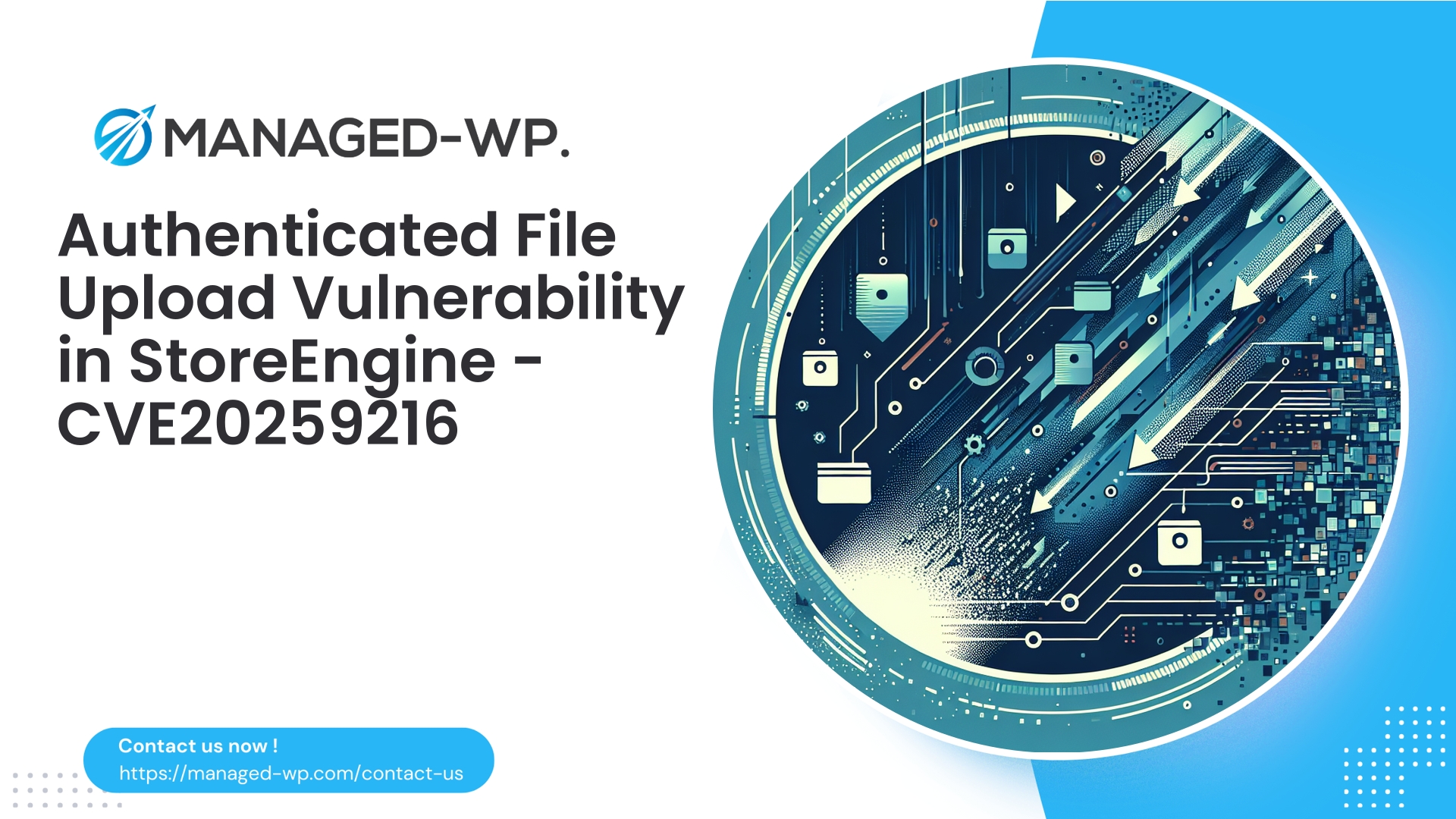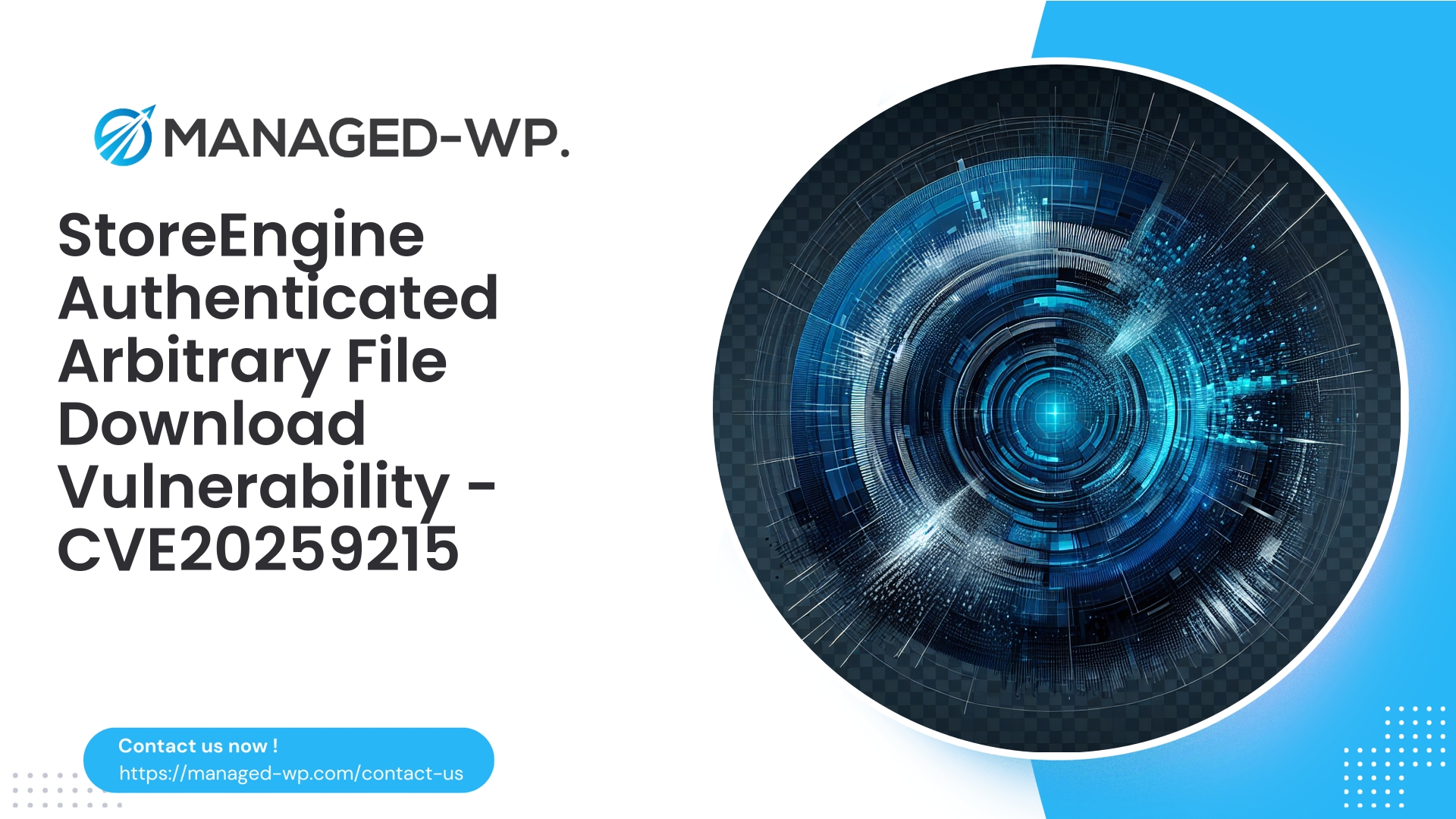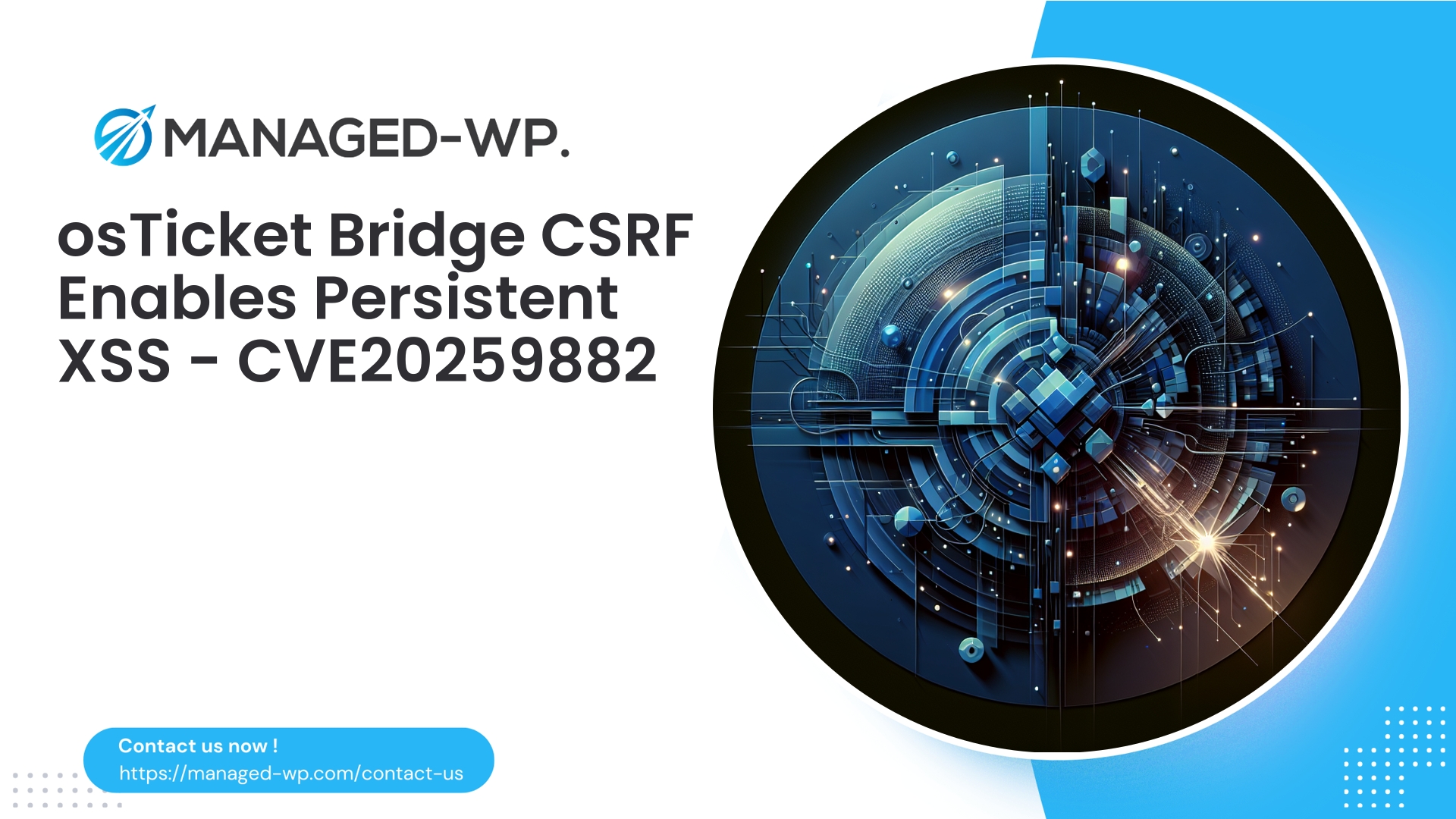| 插件名称 | 商店引擎 |
|---|---|
| 漏洞类型 | 经过认证的任意文件上传 |
| CVE编号 | CVE-2025-9216 |
| 紧急 | 高的 |
| CVE 发布日期 | 2025-09-16 |
| 源网址 | CVE-2025-9216 |
严重警报:StoreEngine ≤ 1.5.0 任意文件上传漏洞 (CVE-2025-9216) – WordPress 管理员需立即采取措施
2025年9月16日,StoreEngine WordPress插件(1.5.0及以下版本)的一个严重安全漏洞被公开披露,漏洞编号为CVE-2025-9216,CVSS评分为8.8。该漏洞允许已认证用户(包括权限仅为订阅者角色的用户)向托管服务器上传任意文件。此类任意文件上传漏洞极其危险,攻击者可利用该漏洞部署恶意可执行文件,从而导致网站完全被攻陷。
如果您的 WordPress 安装使用了 StoreEngine 插件,Managed-WP 强烈建议您将此问题视为关键问题。以下内容由专家分析,概述了技术风险、攻击途径、检测策略、全面的缓解措施(包括短期虚拟补丁)以及推荐的事件响应流程。本简报由美国专业安全专家撰写,面向网站所有者和系统管理员。
概要(TL;DR)
- 漏洞: StoreEngine ≤ 1.5.0 中的已认证任意文件上传漏洞 (CVE-2025-9216)
- 所需访问权限: 具有订阅者级别或同等低权限的已认证用户
- 潜在后果: 远程代码执行、网站接管、数据窃取、恶意软件部署、搜索引擎优化垃圾邮件、持久性后门
- 推荐修复方案: 立即将 StoreEngine 更新至 1.5.1 或更高版本
- 临时措施: 限制低权限角色的文件上传,应用基于WAF的虚拟补丁,禁止在上传目录中执行代码,进行可疑文件扫描
- 如果遭到破坏: 隔离受影响站点,进行取证分析,清除恶意内容,轮换所有凭据,必要时恢复干净的备份。
为什么这种漏洞极其危险
任意文件上传漏洞允许攻击者将潜在的可执行文件上传到您的服务器。一旦上传,这些文件(通常是 PHP 脚本)即可被远程调用,从而在您的服务器环境中执行任意命令。由此产生的一系列后果包括:
- 远程代码执行 (RCE) 可实现对站点的全面控制
- 嵌入持久后门,使其在登录凭证重置后仍然存在
- 敏感数据(例如数据库内容和配置文件)的泄露
- 权限从低级提升至管理员权限
- 在多站点或多租户环境中进行横向移动
- 恶意内容注入造成的品牌和搜索引擎声誉损害
值得注意的是,该漏洞的危害性因其所需的访问权限极低而大大增加:任何已认证的用户,即使是拥有订阅者级别权限的用户(在许多 WordPress 网站上很容易获得此类权限),都可以利用此漏洞。薄弱的注册保护措施或撞库攻击会显著增加风险。
攻击场景概述
- 威胁行为者在开放注册网站上创建订阅者帐户或劫持现有订阅者帐户。
- 他们识别插件的文件上传端点(可能是通过 REST API、admin-ajax.php 或插件路由),并提交精心构造的上传请求。
- 该插件未能正确验证或清理上传文件,导致任意文件可以存储在可通过网络访问的目录中。
- 攻击者访问并执行上传的 PHP/webshell 文件,从而获得持续控制权并根据需要横向移动。
出于负责任的信息披露政策,此处不提供漏洞利用代码,但谨慎起见,应假定漏洞利用工具会在披露后迅速出现。请迅速采取行动,保护您的基础设施。
哪些人风险最大?
- 任何运行 StoreEngine 插件版本 1.5.0 或更早版本的 WordPress 网站
- 开放用户注册或拥有大量低权限用户的网站
- 订阅者或低权限角色可以上传文件的环境
- 多站点或联网 WordPress,其中妥协在站点之间蔓延
请通过 WordPress 管理面板的“插件”或 WP-CLI 命令确认您的版本。
立即响应清单(接下来60分钟)
- 确定 StoreEngine 插件版本:
- WordPress 管理后台:插件 > 已安装插件 > 找到 StoreEngine 并检查版本
- WP-CLI:
wp plugin list --status=active | grep -i storeengine
- 如果存在漏洞(≤ 1.5.0),请立即更新至 1.5.1:
- WordPress 后台:插件 > 更新
- WP-CLI:
wp plugin update storeengine --version=1.5.1 - 如果立即更新不可行,请采取以下短期缓解措施以减少风险。
- 非必要情况下禁用新用户注册:
- WP 管理后台:设置 > 常规 > 取消勾选“任何人都可以注册”。
- 限制或移除低权限用户的文件上传功能:
- 使用角色管理插件或自定义代码来剥夺订阅者的上传权限。
- 如果可用,请禁用与上传相关的插件设置。
- 阻止执行已上传的 PHP 文件:
- 实施
.htaccess文件在wp-content/uploads/阻止 PHP 执行的目录。 - 例子
.htaccess内容:
# 拒绝 PHP 执行php_flag 引擎关闭否认一切
- 实施
- 应用 Web 应用程序防火墙 (WAF) 虚拟补丁:
- 阻止订阅者向 StoreEngine 端点上传文件。
- 阻止可疑文件类型、双重扩展名和包含编码有效载荷的请求。
- 扫描可疑文件和痕迹(参见下文检测部分):
- 如果发现可疑情况,应将网站视为已被入侵,并遵循事件响应协议。
妥协的迹象(需要注意哪些方面)
注意观察以下可疑迹象:
可疑文件
- 内部意外出现了新的 PHP 文件
wp-content/uploads/或插件目录 - 具有双扩展名的文件
image.jpg.php - 最近修改过的核心或插件文件
恶意请求和日志
- 低权限账户针对疑似上传端点发起的 POST 活动
- Content-Type 标头不匹配的请求(例如,image/jpeg 携带 PHP 有效负载)
- POST 请求体中的 Base64 或编码字符串
- 上传相关活动出现异常峰值或速率增加
WordPress 和 WP-CLI 审核
- 检查用户和角色:
wp 用户列表 --fields=user_login,user_email,roles,registered - 搜索最近添加或未知的管理员帐户
- 查找最近修改的文件:
查找 . -type f -mtime -7 -ls
恶意软件扫描
- 使用专门针对服务器和 WordPress 的恶意软件扫描器,检测 webshell 签名。
- 检查是否存在可疑的定时任务或发往未知主机的出站网络流量。
推荐用于调查的 WP-CLI 和 Shell 命令
请谨慎运行以下操作,最好在测试环境中运行或做好备份:
- 确认插件版本:
wp plugin get storeengine --field=version
- 列出上传的 PHP 文件:
查找 wp-content/uploads -type f -iname "*.php" -print -exec ls -l {} \; - 过去 14 天内修改过的文件:
查找 . -type f -mtime -14 -print
- 导出用户列表:
wp 用户列表 --format=csv
- 检查计划的 cron 事件:
wp cron 事件列表
- 搜索 webshell 指标:
grep -R --exclude-dir=wp-content/uploads -nE "(eval\(|base64_decode\(|gzinflate\()" .
短期虚拟补丁和WAF指南
如果无法立即更新 StoreEngine,请使用以下概念规则配置 WAF 以降低风险:
- 禁止在上传过程中执行 PHP 文件:
- 阿帕奇
.htaccess例子:要求所有被拒绝
- Nginx 的等效项:
location ~* /wp-content/uploads/.*\.(php|phtml|php3|php4|php5)$ { return 403; }
- 阿帕奇
- 阻止可疑的多部分上传:
- 阻止文件名以“...”结尾的包含 multipart 文件字段的 POST 请求
.php或包含双重扩展名(例如,.jpg.php).
- 阻止文件名以“...”结尾的包含 multipart 文件字段的 POST 请求
- 按用户角色限制上传端点:
- 阻止权限为订阅者或更低级别的用户向 StoreEngine 上传路由发出请求。
- 阻止上传的 base64 编码的大型有效载荷:
- 当 POST 请求体中包含过长的 base64 字符串时,应进行质疑或阻止。
- 限制可疑行为:
- 限制注册和上传端点的 POST 请求,以减少自动化攻击尝试。
笔记: 在全面实施新规则之前,务必先在监控模式下测试新规则,以避免干扰网站的正常功能。
如果遭到破坏,需要采取的清理和恢复步骤
- 隔离感染部位: 离线或置于维护模式以防止造成进一步损害。
- 保存法医证据: 捕获服务器和应用程序日志以及文件系统快照。
- 决定是重建还是清理: 尽可能从干净的备份中恢复。否则:
- 删除所有可疑文件
- 从可信来源重新安装 WordPress 核心、插件和主题
- 注入恶意条目的审计数据库
- 删除未知管理员帐户并重置特权用户的密码
- 轮换所有凭证: 更新管理员、FTP/SFTP、数据库和API令牌。强制重置密码,特别是对于可能已被盗用的低权限用户。
- 清理计划任务: 删除可疑的 WP-Cron 或服务器定时任务。
- 清理后加固: 强制执行上传执行限制,对管理员访问权限应用多因素身份验证,并限制仪表板编辑。
- 通知: 评估通知用户或相关机构的任何法律/监管义务。
- 寻求专业人士的帮助: 如果感染持续存在或情况复杂,请聘请应急响应专家。
长期风险降低策略
- 保持 WordPress 核心、插件和主题更新,并应用安全补丁。
- 尽量减少已安装的插件;删除任何不再使用的插件。
- 仅允许受信任的用户角色拥有文件上传权限
- 采用具备虚拟修补功能的综合性 Web 应用防火墙
- 阻止在上传和插件资源目录中执行 PHP 操作
- 强制执行强身份验证:对特权帐户使用强密码和多因素身份验证
- 监控日志并针对可疑文件上传、异常 POST 请求或未知用户活动设置警报。
- 定期扫描恶意软件并对您的网站文件执行完整性检查
- 定期审核用户帐户;停用或删除过期/未使用的帐户
Managed-WP 如何保护您的 WordPress 环境
在 Managed-WP,我们的使命是通过多层防御来保护您的网站免受 CVE-2025-9216 等威胁的侵害:
- 托管式 Web 应用程序防火墙 (WAF): 定制的规则集可在恶意上传尝试、可疑 POST 请求、内容类型不匹配以及编码的漏洞利用有效载荷到达您的 WordPress 安装之前,检测并阻止它们。
- 快速虚拟补丁: 在官方插件更新广泛部署之前,我们的专家会立即为新出现的漏洞制定保护规则,从而缩短您的风险暴露窗口。
- 持续恶意软件扫描: 例行扫描可识别恶意文件、后门和 webshell,高级套餐还提供自动删除选项。
- 执行强化指导: 已提供并强制执行阻止执行已上传 PHP 文件的配置。
- 实时监控与警报: 深入了解可疑上传、异常 POST 活动或突然的流量高峰,从而能够快速响应。
- 事件响应与托管支持: 主动帮助和每月安全报告有助于控制和补救企业和高风险环境中的紧急事件。
Managed-WP 的方案兼顾了严格的安全性和对网站正常运营的最小影响。如果您使用 StoreEngine 且无法立即更新,启用 Managed-WP 的 WAF 和虚拟补丁将为您争取宝贵的时间和安心,以便您做好全面修复的准备。
更新后验证清单(升级到 1.5.1 版本后)
更新 StoreEngine 插件后,请执行以下验证步骤:
- 请确认插件版本为 1.5.1 或更高版本:
wp plugin get storeengine --field=version
- 对文件进行全面扫描,查找 webshell 和恶意程序。
- 审计
wp-content/uploads/以及最近文件的插件目录:查找 wp-content/uploads 目录,类型为 f,修改时间为 30 分钟,返回 ls
- 查看用户角色和活动日志,尤其是订阅者帐户。
- 分析服务器日志,查找补丁前后发送到上传端点的可疑 POST 请求。
- 为遵循最小权限原则,移除订阅者/用户角色中所有残留的文件上传权限。
- 仅在完全确认网站完整性后,方可恢复任何暂时禁用的网站功能(注册、文件上传)。
检测签名和安全WAF规则(伪代码)
以下是一些适用于大多数WAF的通用模式;应进行广泛测试,以避免阻止合法使用:
- 阻止上传带有可疑扩展名或双重扩展名的文件:
- 如果多部分文件上传的文件名匹配
/\.(php|phtml|php3|php4|php5)$/i或者包含多个扩展名,例如.jpg.php阻止或挑战。
- 如果多部分文件上传的文件名匹配
- 阻止内容类型不匹配:
- 如果文件扩展名是图像类型(jpg/png/gif),但内容包含
<?php,base64_decode(或者类似的 PHP 代码,阻止上传。
- 如果文件扩展名是图像类型(jpg/png/gif),但内容包含
- 禁止按订阅者角色上传帖子:
- 请求
/storeengine/应阻止来自订阅者角色的上传路由。
- 请求
- 挑战上传的大型 base64 编码有效载荷:
- 标记长度超过阈值的 base64 字符串上传文件,并应用挑战或阻止。
务必先在监控模式下运行这些规则,以评估误报情况。
适用于代理商和托管服务提供商
- 通过库存扫描或 WP-CLI 扫描,识别所有运行 StoreEngine 版本 ≤ 1.5.0 的网站
- 优先更新非生产环境或测试环境
- 在 WAF 范围内部署虚拟补丁,以在分阶段更新的同时降低风险。
- 在修复过程中,考虑对低权限角色的关键上传端点进行主机级屏蔽。
开始使用 Managed-WP Basic(免费)
使用 Managed-WP Basic(免费计划)轻松增强您的基本安全态势,提供必要的托管 WAF 保护和恶意软件扫描,抵御 StoreEngine 上传等威胁:
- 功能强大的Web应用程序防火墙,带宽无限制
- 定期进行恶意软件扫描,以检测可疑内容
- 针对OWASP十大风险(包括关键注入和上传漏洞)的防御措施
免费部署 Managed-WP Basic 即可获得即时保护和可视性,然后评估我们的标准版或专业版套餐(包含自动恶意软件修复、虚拟补丁和事件协助)是否最适合您的环境。了解更多信息并注册: https://my.wp-firewall.com/buy/wp-firewall-free-plan/
结束语——这是一项有时效性的威胁
CVE-2025-9216 利用已认证的订阅者级别访问权限,大幅降低了攻击者的入侵门槛。虽然此访问权限级别被刻意设置得非常低,但在许多 WordPress 网站上,通过开放注册或凭证泄露,通常很容易获得。
为保护您基于 StoreEngine 的网站,请立即:
- 请将 StoreEngine 升级到 1.5.1 或更高版本
- 采取短期安全措施,例如禁用注册和禁止在上传路径中执行 PHP 代码。
- 进行全面扫描并修复已发现的漏洞
- 如果无法立即打补丁,请启用 Managed-WP 的托管 WAF 和虚拟补丁功能。
Managed-WP 提供分级套餐,满足从单站点所有者到大型环境的各种需求,提供快速虚拟补丁、全面的恶意软件清除和专家级事件响应支持。立即行动,保护您的网站、数据和用户。
保持警惕。
Managed-WP 安全团队



















